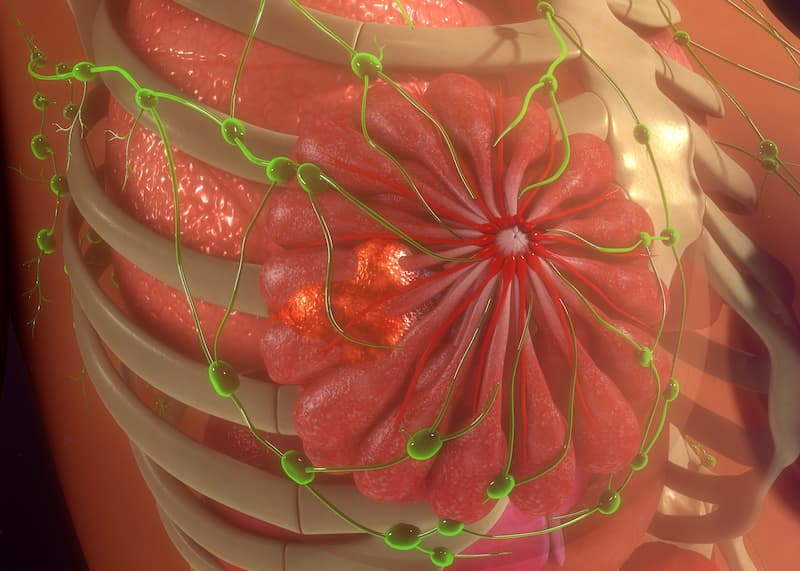Bria-IMT Yields Updated Survival Benefit in Metastatic Breast Cancer
Survival benefit was observed in heavily pretreated populations, including those who progressed after checkpoint inhibition and antibody-drug conjugates.
A final median OS calculation for the phase 2 portion of the study is pending, given some patient subgroups who remain alive as of data cutoff.

The addition of Bria-IMT to checkpoint inhibitors in patients with heavily pretreated metastatic breast cancer displayed enhanced survival outcomes vs current standard-of-care (SOC) treatment, according to findings from a phase 2 study exhibited in a news release from the drug’s developer, BriaCell Therapeutics.1
Data from the phase 2 trial revealed that a cohort of 25 patients treated with the investigational therapy achieved a 1-year survival rate of 52%. Additionally, as of the most recent follow-up, 11 patients remained alive, with 2 patients having achieved a 30.3-month and 38.3-month overall survival (OS), respectively.
A comparable analysis of 1-year survival showed that survival rates with Bria-IMT exceeded the survival expectations of available SOC regimens assessed in similar patient populations. A final median OS calculation for the phase 2 portion of the study is pending, given some patient subgroups who remain alive as of data cutoff.
Of note, survival benefit was observed among numerous highly advanced metastatic breast cancer indications comprised of those who had progressed on prior lines of therapy, including checkpoint inhibitors and antibody-drug conjugates such as sacituzumab govitecan-hziy (Trodelvy) and fam-trastuzumab deruxtecan-nxki (Enhertu). No treatment discontinuations that were attributable to Bria-IMT treatment had occurred.
“BriaCell’s phase 2 data indicate a robust survival signal and a well-tolerated profile,” Adam M. Brufsky, MD, PhD, FACP, professor of medicine at the University of Pittsburgh School of Medicine and medical director of the Magee-Women's Cancer Program, said in the news release on the trial.1 “These results reinforce [Bria-IMT’s] potential to improve survival and tolerability for [patients with] late-stage [disease].”
The phase 2 trial assigned 54 patients with heavily pretreated metastatic breast cancer to receive Bria-IMT plus checkpoint inhibition. The median number of prior lines of therapy in this patient population was 6. Thirty-seven patients were treated with a formulation of the agent currently undergoing investigation in a phase 3 clinical trial (NCT06072612) in patients with metastatic breast cancer.
Patients in the phase 3 study will be randomly assigned 1:1:1 to receive the Bria-IMT regimen plus combination therapy, an active comparator regimen, or the Bria-IMT regimen alone.2 After the enrollment of the first 150 patients, the study population will be randomly assigned 1:1 to either the combination therapy or comparator arms.
In the Bria-IMT regimen arms, treatment will occur in 3-week cycles, with therapy continuing in the absence of disease progression or safety concerns and imaging assessments occurring twice every 6 weeks and then 8 weeks thereafter. The Bria-IMT regimen will include 300 mg/m2 of cyclophosphamide on days –2 and –3, intradermal SV-BR-1-GM starting on day 0 divided into 4 inoculations, and checkpoint inhibitor infusion plus intradermal interferon given on days 1 to 3 within each Bria-IMT inoculation site. Cycling for comparator therapy will be based on a site’s SOC.
The primary end point of the phase 3 study will be OS. Secondary end points will encompass progression-free survival, clinical benefit rate, overall response rate, quality of life, and central nervous system event-free survival.
To be eligible for enrollment, patients 18 years or older must have histologically confirmed, locally recurrent unresectable and/or metastatic breast cancer, have progressed after prior therapy, have no meaningful alternative therapies available, have an expected survival of at least 4 months, and have an ECOG performance score of 0 to 2.
“Many patients with metastatic breast cancer unfortunately have disease progression despite treatment with [checkpoint inhibitors] and [antibody-drug conjugates],” Aditya Bardia, MD, MPH, FASCO, professor of medicine in the Division of Hematology/Oncology and director of translational research Integration at the UCLA Health Jonsson Comprehensive Cancer Center, stated in the news release.1 “BriaCell’s survival data in [the] single-arm phase 2 trial highlight the potential activity of Bria-IMT in combination with [checkpoint inhibitors] and are subject to ongoing investigation in a phase 3 randomized clinical trial in [metastatic breast cancer].”
References
- BriaCell phase 2 survival achievement: fifty-two percent of patients surpass one-year milestone in metastatic breast cancer. News release. BriaCell Therapeutics. July 8, 2025. Accessed July 8, 2025. https://tinyurl.com/52pzb9p4
- Study of the Bria-IMT regimen and CPI vs physicians' choice in advanced metastatic breast cancer: (BRIA-ABC). ClinicalTrials.gov. Updated June 18, 2025. Accessed July 8, 2025. https://tinyurl.com/38jytnju
Gedatolisib Combo With/Without Palbociclib May Be New SOC in PIK3CA Wild-Type Breast Cancer
December 21st 2025“VIKTORIA-1 is the first study to demonstrate a statistically significant and clinically meaningful improvement in PFS with PAM inhibition in patients with PIK3CA wild-type disease, all of whom received prior CDK4/6 inhibition,” said Barbara Pistilli, MD.